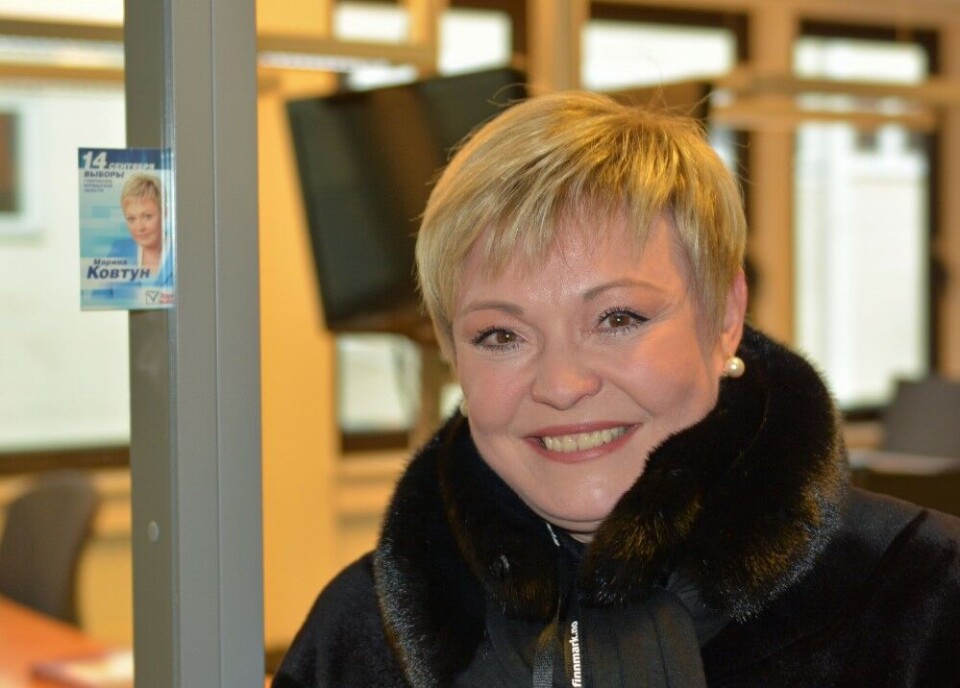
Autumn is here and governors fall
The head of the Murmansk region is again on the lists for elimination.
p.p1 {margin: 0.0px 0.0px 0.0px 0.0px; line-height: 19.0px; font: 16.0px ‘Times New Roman’; color: #000000; -webkit-text-stroke: #000000}p.p2 {margin: 0.0px 0.0px 0.0px 0.0px; line-height: 14.0px; font: 12.0px Times; color: #000000; -webkit-text-stroke: #000000; min-height: 14.0px}span.s1 {font-kerning: none}
Text by Tatiana Britskaya
A source close to the presidential administration reported to RBC News on Thursday that the Kremlin is looking for a replacement for the current regional Governor of Murmansk, Marina Kovtun. And Novaya Gazeta’s sources confirm that consultations with potential candidates for her post are now being held in the presidential administration.
This is not the first time Kovtun has fallen onto the “on the way out list” but so far, she has managed to keep herself in the chair. A series of internal political scandals have contributed to the governor’s obviously low rating and are greatly increasing the call for her resignation. And even if Kovtun is allowed the opportunity to run for a new term when her current term of office expires next year, a favorable outcome would be highly unlikely. If we use Svetlana Orlova, ex-governor of the Vladimir Region as an example, her time in office quite similar to Kovtun’s, we can see that any continuation of her career probably isn’t going to happen.
Experts say that the main reason for a probable resignation is that after 6 years in power, Kovtun has managed to pick quarrels with almost everyone and has not acquired enough weighty allies. Among the myriad of negatives:
Kovtun cannot hide that as a result of a years long quarrel with the leadership of the regional center, she has lost a great amount of clout. Aleksey Veller, the former mayor of Murmansk, won the elections to the State Duma and gained more political weight as a deputy to the Federal Assembly.
Kovtun’s sharp conflict with the leadership of the previous regional duma convocation has not been forgotten. Speaker Vasily Shambir publicly called Kovtun a customer during his criminal prosecution. Shambir has recently been released on parole.
Elvira Makarova’s criminal case is going to trial. Makarova, ex-minister of ecology in the region and a one time member of Kovtun’s inner circle, is accused of having built herself an expansive dacha retreat on lands supposedly protected by her department. And connected to this process, Vice-Governor Igor Babenko’s abuse of authority trial also begins this week. According to the investigation, Babenko and three more officials of the regional administration collected voluntary contributions from extra-budgetary funds and funneled them into the business supposedly supplying provisions and sporting goods for the amusement of the governor and her guests at their exclusive wooded retreat, all under the pretext of charity. At stake is the disappearance of 26 million rubles (about €350,000). So far, Kovtun has somehow managed to avoid even being questioned despite the defendants actively demanding the chance to confront the governor in open court. The main intrigue of the process is whether the court even has the power to summon the regional head.
Marina Kovtun also did not skimp on loud statements during the investigation of the case, accusing security officials of using these cases to put pressure on her. The result of this is a further spoiled relationship not only with the elites but also with the power bloc.
Amidst all of this, what is probably Kovtun’s last gubernatorial term is also reeling from intractable social problems, the perpetually underfunded, under staffed and under equipped health care system being the largest. The administration seems to have survived the Daria Starikova scandal, which had drawn attention at the federal level. But regional medicine is in such a state that it will be impossible to ignore similar stories in the future. In the region, hospital are staffed by only 60% of the required number of doctors and programs designed to attract specialists from other regions have not been successful. Yet another failure was the chaotic district hospital optimization plan which succeeded only in all but shutting down access to free medical care for people in the provinces. Under the grandiose plan, people are forced to go to outpatient clinics sometimes as much as 100 to150 km away. The decrepitude of medical equipment in a number of hospitals is at 100%. And the hospitals cannot even pay the physicians they have at the level a May presidential decree demanded. But at the same time, because 90% of the funding has already been thrown into the budget to fulfill the decree, it seems the hospitals now owe money to both their suppliers and in taxes. According to the Accounts Chamber, the amount of debt as of the end of the first half of the year amounted to more than 22.5 million euro.
And finally, Kovtun’s rating fell even more when her administration did not even try to defend the preservation of the preferential retirement age for residents of the Far North.
So, Kovtun’s days might be numbered. Moscow and big business have the region gaining weight strategically and economically these days as large-scale industrial interests have converged in the Murmansk region. Rusal, Norilsk Nickel, Evrokhim, Fosagro, Rosatom and Novatek have been building here and the Northern Sea Route is intensively developing. And, in this new game of big money politics, nothing the governor might have to say would be of any significance to Moscow except if it came in a letter of resignation.
This story is originally posted by the Novaya Gazeta and re-published as part of Eyes on Barents, a collaborative partnership between news organizations and bloggers in the Barents region















